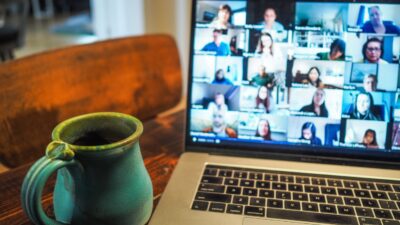From establishing networks and meeting colleagues to learning organisational culture, what’s it like starting a new job when working remotely during a pandemic?
As COVID-19 sets out to change the world forever, join Sandra Peter and Kai Riemer as they think about what’s to come in the future of business.
Shownotes
How to start a new job during a pandemic (NYT)
Starting a job during a pandemic (ABC)
Starting a new job remotely (Techrepublic)
Starting a position remotely (CNBC)
Workplace perks during the pandemic
Companies strain to outdo each other with work-from-home perks (think ukuleles)
We are changing the way we hire and there is no going back
Hiring in crisis, onboarding in a pandemic
Our previous discussion of Gen Z on Corona Business Insights
Our previous discussion of remote work on Corona Business Insights
This episode is part of a podcast series covering what COVID-19 will mean for the business world, where we look at the impact on the economy, businesses, industries, workers and society. This is part of our ongoing coverage of the impact of COVID-19 on the future of business.
Follow the show on Apple Podcasts, Spotify, Overcast, Google Podcasts, Pocket Casts or wherever you get your podcasts. You can follow Sydney Business Insights on Flipboard, LinkedIn, Twitter and WeChat to keep updated with our latest insights.
Send us your news ideas to sbi@sydney.edu.au.
Intro From the University of Sydney Business School, this is Sydney Business Insights.
Sandra And this is Corona Business Insights. I'm Sandra Peter.
Kai And I'm Kai Riemer.
Sandra And we're back unpacking the impact of COVID-19 on business, the economy, industry, government, workers and society, and looking at the effects of the pandemic.
Kai And this podcast is part of a larger initiative by the University of Sydney Business School, you can find our COVID business impact dashboard online at sbi.sydney.edu.au/coronavirus.
Kai And today we talk about starting a new job during the COVID-19 pandemic.
Sandra It's been almost six months since most of us have started working from home. And we've discussed a lot on the podcast, what it's like to be working from home, what it's like for organisations to have a remote workforce. But we haven't really looked at what it's like to start a new job during the COVID pandemic.
Kai And while we will also take a look at this from the organisational perspective, we thought today, we might actually take the other viewpoint. What is it like to start a new job with a company remotely when you cannot just rock up to the office and get straight into it, when you're actually stuck at home?
Sandra And for many, this has been a very different experience. One of my friends started their new job with one of the large banks in Australia, and pretty much on the first day received a work laptop and an iPhone from their employer, and the requisite paperwork that were delivered to her house. And that was pretty much it. Welcome to work.
Kai Yes, welcome to work in your own living room or at the kitchen table. So we want to ask what is it like to get to know a new place when there is no place, to get to know your colleagues when you can't actually meet up with your new colleagues? What does it take for a new employee to make their way into an organisation?
Sandra On the one hand, there's of course all the logistics, when you start a new job, you might have to get used to the company's preferred tools, whether that is Microsoft Teams, or Slack or Zoom, any other collaboration products that they might be using, and company systems.
Kai And while it is easy, usually to sign up to these systems, you will receive logins in the mail, you log onto these systems, you might be familiar with some of these systems, there's a lot more to learn about how these systems are actually being used. We know from our own research at the University of Sydney Business School that platforms such as Teams can be used in very, very different ways in different organisations, even in parts of an organisation, they're very flexible tools. So what will have to happen is to learn your way into the ways in which communication happens, the do's and don'ts, how to save documents, where to find what, is it okay to just send private messages to everyone? What's the etiquette of communicating in shared spaces, in group spaces, there's a lot of things that one will have to observe and get used to.
Sandra And this is where things start to get a little bit trickier. Because whilst for many of these things you would have normally just reached to whoever was sitting next to you, and you would have asked how to do this or how to access certain systems, you're now quite likely to try to spend time solving things yourself, or ending up on Google looking for a solution, or posting messages in Slack trying to find out what the right answer is, and maybe not really daring to reach out and bother your boss or your colleagues with certain questions. Which brings us to the question of who should you actually ask?
Kai Yes, when we're in the office, we can just ask around, we can just pop into someone's office, we will find out quickly who knows the answer to a certain question. When we're working remotely, these things become a little bit more difficult. In general, it will take a little bit more time to figure out who is knowledgeable in what topic, who we can ask for certain topics, who is actually in charge. And more broadly, how does office politics actually work? So it would be really important for a new starter to be very proactive in meeting with people setting up one on ones with colleagues spending time to actively get to know people because the situations and occasions where we run into people during lunch breaks at the watercooler the coffee machine just don't exist.
Sandra And whilst if you're starting your job in an office, you will quickly pick up who to talk to, who solves problems, but also how people talk to each other, how they approach each other, what the tone of the conversation is. In an online only environment this requires a lot more work. A lot of this would be picked up by overhearing conversations for instance or listening in or joining in. This has to now be deliberately orchestrated so that you have such opportunities.
Kai So that starts with paying close attention in meetings. Rather than sitting back and waiting for one's own cue for making a contribution, it will pay off to actually observe others talking, how they relate to each other, because the opportunities for doing so are now much more limited. So these are precious occasions where a new startup will want to be very much on the ball. Also, you know, keep your video on, make yourself present, because when we're working remotely, we have to be much, much more proactive in asserting ourselves into conversations, in making ourselves known. Because if we just sit back and try to focus on our tasks, we will be largely invisible. So it takes a lot more effort to actually become part of the team, part of the organisation.
Sandra It's also important to do bring some of your personality to work. Often when we start a new job, our conversations and our emails tend to be quite neutral and fairly formal. However, it's important to try to achieve what you normally would with hallway conversations or with coffee chats and try to connect to your new teammates or your new subordinates or your new bosses try to connect to them on a personal level as well.
Kai And that poses challenges for those of us who are a little bit quiet. Quite ironically, during the first few weeks of the pandemic, we've read reports where it said that working from home might actually be good for people who are more introverted because now they're not forced into all the social aspects of office life. And that's fine when you're already part of the organisation. But when you're starting a new job, being introvert might actually pose an additional challenge, because now you have to be extra outgoing, you have to seek out others, you have to set up meetings, you have to set up phone calls in order to get to know others and make yourself visible.
Sandra That can also mean to be aware of and actively participate in any social online events that the organisation might have. On our team for instance, we have Friday drinks that people participate in and socialise in and talk about things other than work. Although I'm quite aware that in some cases, you know, it might be difficult to talk about anything, including the weather, because people don't go outside or weekend plans, again because people don't leave their houses. And many companies have gone out of their way to try to enable this sort of experiences. We came across an example of a company in Cambridge called Nimbus Therapeutics that used to cater lunch for its entire staff three times a week at their headquarters, that now attempts to reproduce that online by sending people lunch kits at home.
Kai And we'll put an article in the shownotes in the Wall Street Journal, which lists a few of those activities, especially in startup companies in the biotech field, where companies are competing for talent. There seems to be a never-ending quest for the next social event, ranging from ukulele building workshops to trivia nights, comedians on Zoom, virtual scavenger hunts, and even hiring bartenders and sending out ingredients to learn the art of cocktail making.
Sandra Just to go back there, you mean ukulele playing, not building?
Kai No, no, no, I meant ukulele building. They were sent out ukulele kits for building it. That's for when learning to play it is not enough.
Sandra And of course, there's a lot more we could say here as companies have been trying to outdo each other in terms of perks. And a survey from before the coronavirus pandemic showed that more than half the respondents said that workplace perks were among the top consideration before accepting a new job. And those have varied widely from companies like Airbnb giving thousands of dollars in travel stipends to their employees, to other companies covering pet adoption fees for their employees, or even Slack these days giving employees one Friday off every month.
Kai The so-called Friyays. So we really seem to be living in a two-speed economy. On the one hand, we see mass layoffs, in other sectors we see quite fierce competition for talent, especially now that everyone's just sitting at home. It's much much easier to switch between employers of course. But we want to ask the question from the organisational point of view. What is it that organisations now can do or have to do to actually make the onboarding a really good experience?
Sandra So of course the HR departments in organisations have to take on a much more more proactive and caring role. We know that normally many of these compliance-driven departments can feel fairly distant and impersonal in the way that they have to approach the logistics and the regulatory requirements around getting new employees on board. However, during the pandemic, it is important for them to be much more personal, much more available and much more emotionally engaged with new employees.
Kai So it becomes much more important to line up meetings with key people in the organisation, not just with the immediate team that someone will be working in but also making available other key people that are relevant for the person to know for one-on-one or group Zooms beyond just sending out emails with links to the kind of compliance trainings that we're all used to from HR departments.
Sandra But there's one more aspect to starting a new job and indeed continuing a new job, and that has to do with learning on the job.
Kai So many organisations have successfully employed buddy systems for a long time where a new hire is buddied up with long-standing employee can work alongside them, have them as someone who they can ask any questions. And that, of course, is a recipe that works in a remote environment as well, even though it takes a little bit more communication, a little bit more planning, but is usually a good way for someone to at least have one person that they can go back with any question that they don't know who to target to otherwise.
Sandra Many times junior employees would learn from seeing their more senior colleagues undertake certain activities, you have to actively now get invited to those projects or actively seek out those learning opportunities. Otherwise, there's a real risk for long term rising inequality and opportunities. For instance, not only based on age, people who have more experience with previous jobs would know how to seek out these opportunities, versus people who have just finished their studies. This might be the first job that they undertake during the pandemic, but also inequalities that might arise from not having the opportunity to socialise more broadly.
Kai Mind you, and we've mentioned this on the podcast before, it is much easier to transition into remote work environment when you have your social networks in and beyond the organisation firmly established, compared to someone just starting out, having to build social networks having to get to know everyone, which is so much harder when those serendipitous contacts in the office environment fall away.
Sandra And let's not forget here the learning opportunities for the organisation as well. Quite often new employees or people just starting out the job coming with a fresh perspective with different ways of doing things are an opportunity for organisations to improve themselves. organisations must not forget to take advantage of those new ways of thinking new opportunities as they're onboarding people.
Kai So it's often the ones that are coming to an organisation afresh that might point to things that don't seem to make sense, that are slightly off. And if the organisation gives those people a voice, this can present real opportunities to change processes, to make things better, to learn from the kind of insights that a new hire might bring. But when we're remote and during a pandemic, when everything is not normal, everything is off, and a lot of the work processes are hidden from someone coming in, those opportunities, unfortunately, are also much much rarer.
Sandra Yet they can be very important. And we'll add research here in the shownotes coming out of Harvard University that showed that new employees who are welcomed into an organisation and allowed to express their individuality and showcase their own ways of working, stayed with organisations much longer than those were made to take onboard the organisations already established practices.
Kai And that's where we want to leave it. To everyone out there starting a new job remotely, good luck and have a good start. This was Corona Business Insights.
Sandra Thanks for listening.
Kai Thanks for listening.
Outro From the University of Sydney Business School. This is Sydney Business Insights, the podcast that explores the future of business.






